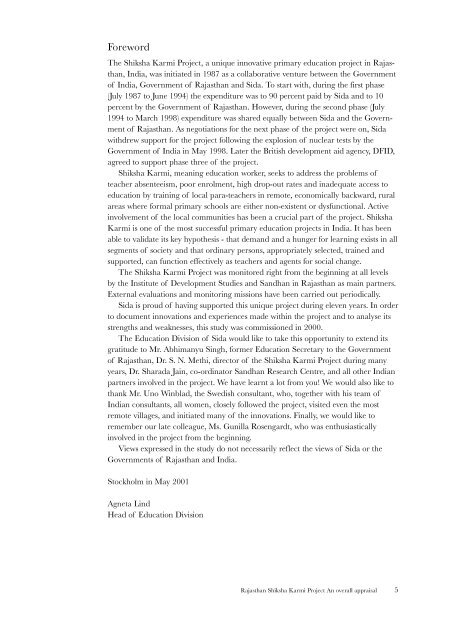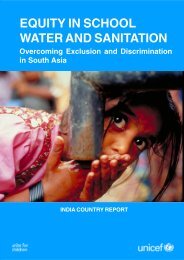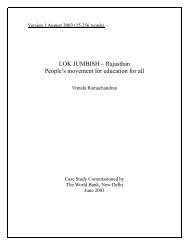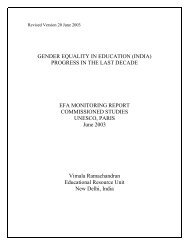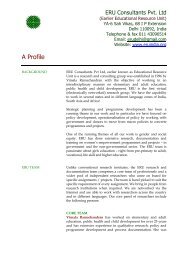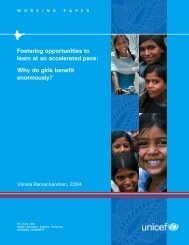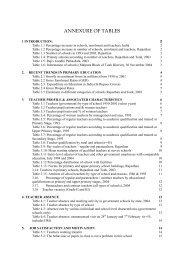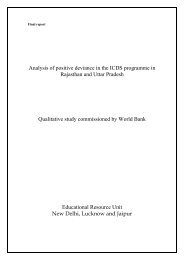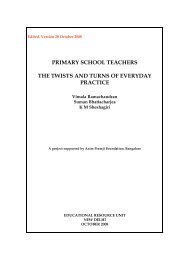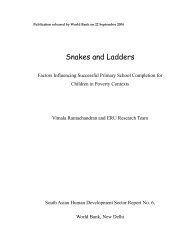Rajasthan Shiksha Karmi Project An overall appraisal
Rajasthan Shiksha Karmi Project An overall appraisal
Rajasthan Shiksha Karmi Project An overall appraisal
You also want an ePaper? Increase the reach of your titles
YUMPU automatically turns print PDFs into web optimized ePapers that Google loves.
ForewordThe <strong>Shiksha</strong> <strong>Karmi</strong> <strong>Project</strong>, a unique innovative primary education project in <strong>Rajasthan</strong>,India, was initiated in 1987 as a collaborative venture between the Governmentof India, Government of <strong>Rajasthan</strong> and Sida. To start with, during the first phase(July 1987 to June 1994) the expenditure was to 90 percent paid by Sida and to 10percent by the Government of <strong>Rajasthan</strong>. However, during the second phase (July1994 to March 1998) expenditure was shared equally between Sida and the Governmentof <strong>Rajasthan</strong>. As negotiations for the next phase of the project were on, Sidawithdrew support for the project following the explosion of nuclear tests by theGovernment of India in May 1998. Later the British development aid agency, DFID,agreed to support phase three of the project.<strong>Shiksha</strong> <strong>Karmi</strong>, meaning education worker, seeks to address the problems ofteacher absenteeism, poor enrolment, high drop-out rates and inadequate access toeducation by training of local para-teachers in remote, economically backward, ruralareas where formal primary schools are either non-existent or dysfunctional. Activeinvolvement of the local communities has been a crucial part of the project. <strong>Shiksha</strong><strong>Karmi</strong> is one of the most successful primary education projects in India. It has beenable to validate its key hypothesis - that demand and a hunger for learning exists in allsegments of society and that ordinary persons, appropriately selected, trained andsupported, can function effectively as teachers and agents for social change.The <strong>Shiksha</strong> <strong>Karmi</strong> <strong>Project</strong> was monitored right from the beginning at all levelsby the Institute of Development Studies and Sandhan in <strong>Rajasthan</strong> as main partners.External evaluations and monitoring missions have been carried out periodically.Sida is proud of having supported this unique project during eleven years. In orderto document innovations and experiences made within the project and to analyse itsstrengths and weaknesses, this study was commissioned in 2000.The Education Division of Sida would like to take this opportunity to extend itsgratitude to Mr. Abhimanyu Singh, former Education Secretary to the Governmentof <strong>Rajasthan</strong>, Dr. S. N. Methi, director of the <strong>Shiksha</strong> <strong>Karmi</strong> <strong>Project</strong> during manyyears, Dr. Sharada Jain, co-ordinator Sandhan Research Centre, and all other Indianpartners involved in the project. We have learnt a lot from you! We would also like tothank Mr. Uno Winblad, the Swedish consultant, who, together with his team ofIndian consultants, all women, closely followed the project, visited even the mostremote villages, and initiated many of the innovations. Finally, we would like toremember our late colleague, Ms. Gunilla Rosengardt, who was enthusiasticallyinvolved in the project from the beginning.Views expressed in the study do not necessarily reflect the views of Sida or theGovernments of <strong>Rajasthan</strong> and India.Stockholm in May 2001Agneta LindHead of Education Division<strong>Rajasthan</strong> <strong>Shiksha</strong> <strong>Karmi</strong> <strong>Project</strong> <strong>An</strong> <strong>overall</strong> <strong>appraisal</strong>5


